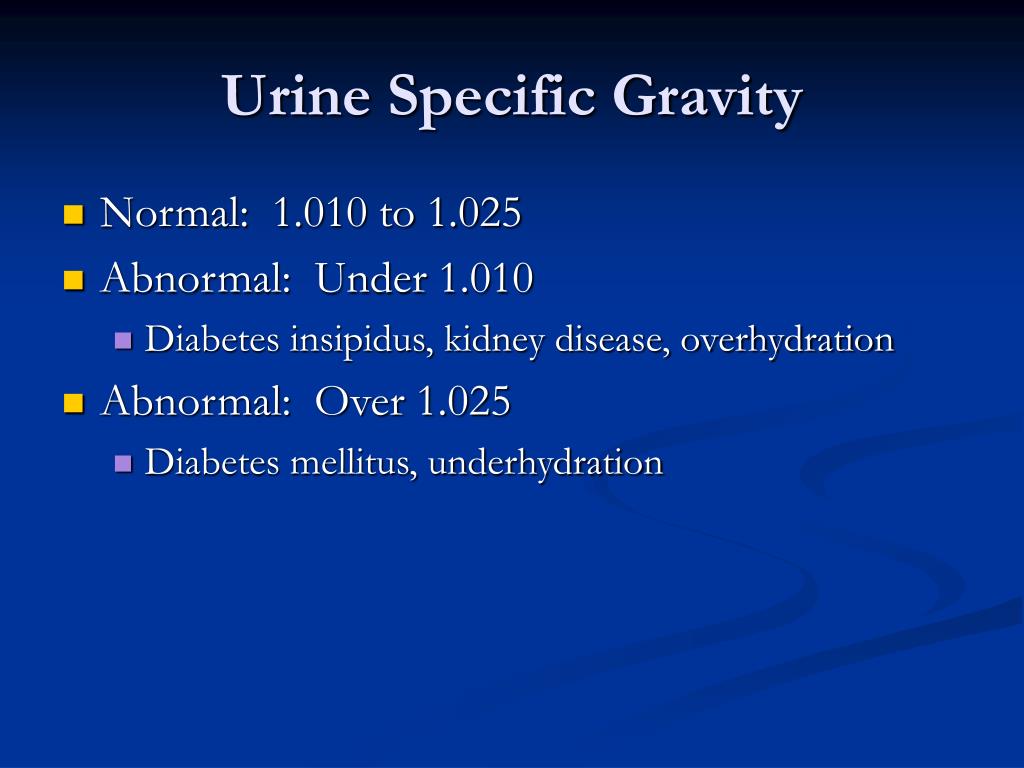

Hypovolemic patients usually have a specific gravity >1.015. Osmolality is normally used for more detailed analysis, but USG remains popular for its convenience. In neonates, normal urine specific gravity is 1.003. decreased concentration of solutes in urine) may be associated with renal failure, pyelonephritis, diabetes insipidus, acute tubular necrosis, interstitial nephritis, and excessive fluid intake (e.g., psychogenic polydipsia). Not drinking fluids for a certain amount of time. Drinking large amounts of water or receiving fluids through a vein. Hypovolemic patients usually have a specific gravity >1.015.ĭecreased specific gravity (hyposthenuria, i.e. For this test, the specific gravity of urine, urine electrolytes, and/or urine osmolality are measured before and after one or more of the following: Water loading. If your pets kidneys are healthy, its urine specific gravity will be constantly changing but its kidneys will do. In neonates, normal urine specific gravity is 1.003. Pure water has a specific gravity of 1.0. A specific gravity greater than 1.035 is consistent with frank dehydration. The kidneys must produce a minimum urine volume of about 500 mL/day to rid the body of wastes. That is best if you drink water in the morning on an empty stomach. The normal range is one to two liters per day. Just drink at least 6 to 8 glasses of water for a few days. increased concentration of solutes in the urine) may be associated with dehydration, diarrhea, emesis, excessive sweating, urinary tract/bladder infection, glucosuria, renal artery stenosis, hepatorenal syndrome, decreased blood flow to the kidney (especially as a result of heart failure), and an excess of antidiuretic hormone caused by the syndrome of inappropriate antidiuretic hormone secretion. Riaz Reply FebruI think your urine findings are normal unless you have any symptoms. Increases in specific gravity (hypersthenuria, i.e.

In adult humans, normal specific gravity values range from 1.010 to 1.030.Īdults generally have a specific gravity in the range of 1.010 to 1.030. The concentration of the excreted molecules determines the urine's specific gravity. The specific gravity ranges from 1.003 to 1.035. The body excretes some of these waste molecules via urination, and the role of the kidney is to concentrate the urine, such that waste molecules can be excreted with minimal loss of water and nutrients. The pH of human urine ranges from 5.5 to 7, averaging around 6.2. Normally, fresh urine is either clear or very slightly cloudy. Turbidity: The turbidity of the urine sample is gauged subjectively and reported as clear, slightly cloudy, cloudy, opaque or flocculent. One of the main roles of the kidneys in humans and other mammals is to aid in the clearance of various water-soluble molecules, including toxins, toxicants, and metabolic waste. The density of normal urine ranges from 0.001 to 0.035.

For background on kidney function, see Renal function. Fixed specific gravity, in which values remain 1.010 regardless of fluid intake, occurs in chronic glomerulonephritis with severe renal damage.


 0 kommentar(er)
0 kommentar(er)
